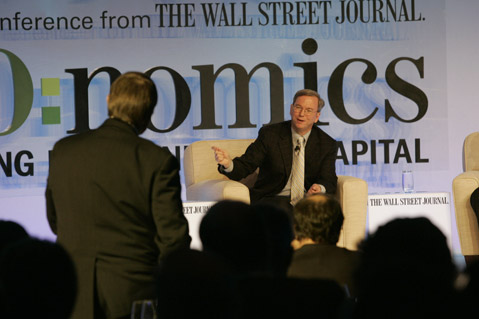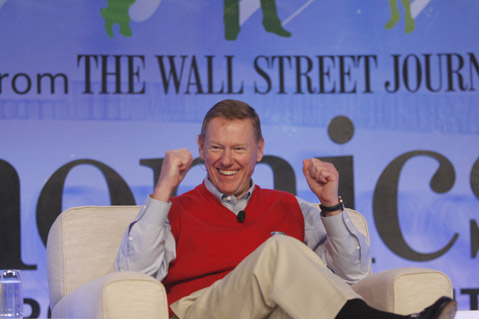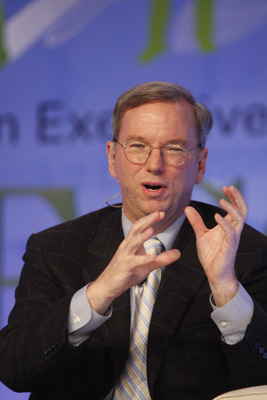ECO:nomics Returns to Bacara
Opening Night of Corporate Greening Conference Features Ford and Google CEOs

The Wall Street Journal‘s second annual ECO:nomics conference kicked off at the Bacara on Wednesday night, as more than 300 corporate executives and environmental advocates from all over the United States converged at the luxurious resort to mingle, dine fine, listen to onstage conversations with esteemed guests, and chat about making their companies more environmentally friendly. Like last year (see independent.com‘s 2008 coverage here), the list of invitation-only attendees is a who’s who in the international business and policy-making community, from former vice president-turned-eco-hero Al Gore and European Union president V¡clav Klaus to legendary oil and gas man T. Boone Pickens and the heads of three major American utility companies. The evening’s top billing went to Ford CEO Alan Mulally and Google CEO Eric Schmidt, who both discussed where they saw renewable resources and reformed energy policy fitting into the country’s future.

In his opening remarks to the crowd, the Journal‘s Alan Murray reminded that last year everyone was wondering about whether the country was entering a recession, and now the concern is whether we’re actually in a depression. Nonetheless, he said that interest in the conference was high, explaining, “The response was even stronger this year.” Murray discussed how a bad economy makes it perhaps even more challenging for businesses to go green, and cited a poll of everyday Americans showing that while 71 percent want more fuel efficient cars, 56 percent would not be able to pay more for them right now.
That and other matters were on the table for Ford CEO Mulally, dressed casually in a red sweater vest. Interviewed on two sides by the Journal‘s Kim Strassel and Jeffrey Ball, who introduced him as “the only Detroit auto CEO who’s not taking a federal bailout,” Mulally explained how Ford had shed a number of brands because the company had “lost clarity” over the years, and said that now “we just have a laser focus on Ford.” Much of the conversation came off as a big advertisement for Ford’s future line of cars, which, according to Mulally, are going to be the “best in class” in terms of fuel efficiency, quality, and safety. And they will also be smaller, as the company shifts away from the trucks and SUVs that have made up more than 60 percent of its business for the past few years.

Addressing eco concerns, Mulally said, “What we’re all about is being able to make the energy clean and to use the energy clean” and called the Obama administration’s initial energy and environmental plans “a good start.” He predicted that the future will be electric cars, and said that Ford is already moving in that direction.
What’s most engaging about the ECO:nomics conference is the format for onstage guests, since it does not involve actual speeches but is rather a conversation. And that conversation includes members of the crowd, whom moderators aren’t afraid to call on by name. In the case of Mulally, T. Boone Pickens was called upon to ask a question, and the Texas mogul unleashed a torrent of questions related to natural gas and ending the reliance on foreign oil. “Do you have a bias against natural gas?” Pickens asked Mulally bluntly, to which the Ford exec explained that he ran a “consumer company” and that the market was largely responsible for their fuel decisions.
Next on stage was Google CEO Eric Schmidt, who’s been on numerous television shows over the past few months touting his company’s national energy proposal, which was developed to help direct official policy and hopefully inspire others to come up with their own solutions. An engaging and earnest talker, Schmidt explained that the motivation behind the Internet search giant Google, whose corporate motto is “Do No Evil,” is to continually ask themselves, “Can we change the world in a positive way?” That was the goal of releasing their own energy plan, which promises among other things that, by 2030, 30 percent of the country’s energy can come from renewable resources and that, despite the costs of getting there, money can be made along the way.

“Green energy done right is more profitable than the old kind of energy,” said Schmidt, explaining that the $3.5 trillion that would need to be invested over 22 years to make Google’s plan work would actually end up saving $4.4 trillion. “If you invest the right way,” he explained, “you can make money doing it.”
But he was also cognizant that this is not solely an American problem. “We can solve all the problems in the Untied States,” he said, “and still die, as a society.” That’s because the fast-emerging economies of India and China are still reliant on carbon-based energy. But Google’s energy plan was limited to the United States because that’s where reliable data could be found, explained Schmidt.
Schmidt was interviewed by the Journal‘s Alan Murray, who called upon American Electric Power’s CEO Michael Morris to comment from the crowd. As a leader of one of the country’s biggest utilities, Morris said that he thought Google’s 2030 goals seemed impossible. But that prompted PG&E’s head Peter Darbee to stand up in the back of the room, and explain, “Whenever you put an objective out there, it seems unachievable at first.” Darbee, who was scheduled to sit a panel with Morris the next morning, said that PG&E had made great strides toward renewable resources in a short amount of time, and that it could be done by others too.
One of the night’s last crowd questions came from the Sierra Club’s Carl Pope, who directed his question to Murray, although his charges seemed aimed at most in attendance. Pope suggested that a lot of this conversation seemed to be coming too late, and Murray defended the conference as an attempt to jump-start progress. But Schmidt responded best, saying, “Change does not occur when things are going well. Change occurs when people are scared.” Schmidt suggested that now-as the American economy teeters on depression, all classes of people are being affected, and communities nationwide are feeling the pinch-is the right time to get something done.
Tune in later to independent.com for more ECO:nomics coverage.



